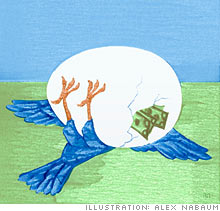Easy money can kill a business
Financing is almost impossible to get right now. In some cases, that's not a bad thing.

(Fortune Small Business) -- In 2001, DNA Software won a $1.5 million, three-year grant from the state of Michigan to develop computer programs for genomics researchers. Four years later, the eight-employee Ann Arbor company was on the verge of bankruptcy.
What happened? On paper DNA Software had been living every startup's dream. The government was "very supportive of what we were trying to do," recalls CEO Don Hicks. The grant paid the company in annual installments in exchange for preferred shares with no controlling interest.
But as three years' worth of steady money rolled in, looming problems at DNA went undetected. The cash cushion allowed executives to focus almost entirely on product development, without giving much thought to sales or marketing. Until the grant money dried up, they failed to realize that they had grossly overestimated the potential market for DNA's highly specialized services.
In 2005, with his company on the verge of collapse, Hicks took a 50% pay cut and started targeting potential customers with courtesy calls and demonstrations. DNA was forced to run on cash from its own operations. That required executives to "hunt only what we could kill," says Hicks.
During the next three years he brought DNA Software back to profitability. Since 2005 the company has doubled its staff, and it is on track to bring in $1.5 million in revenue this year.
Despite the current clamor for loans, business owners would do well to remember that money is not the mother of invention. On the contrary, capital constraints often spur innovation. Historically, scarce capital has forced many businesses that were founded during downturns -- such as HP (HPQ, Fortune 500), which debuted in 1939 during the Great Depression, and FedEx (FDX, Fortune 500), launched in the oil crisis of 1973 -- to eschew debt and remain agile.
Small business owners should do as much as they can without relying on other people's money, recommends Jim Anderson, an Orange County, Calif. counselor for SCORE, a national nonprofit organization that teams successful small business owners with entrepreneurs who are seeking advice.
"People who self-finance generally don't become sloppy," he says. "There is a tendency for people who have borrowed a big chunk of money to relax."
Mike Michalowicz, CEO of Obsidian Launch, a Boonton, N.J., consulting firm that invests in small startups, admits that external funding gave him the flexibility to ignore sound business practices -- and reality -- when he founded his first business, Olmec Systems, in 1996. The company, which set up computer networks for financial firms, swung from profitability to losses of as much as $50,000 in a single month after securing a $250,000 SBA-backed loan. Michalowicz blew the dough on office furniture and unnecessary administrative and sales-support staff, not to mention a new BMW Series 7 sedan.
"My explanation to myself was that if I had a lot of employees and a beautiful car, people would know I was successful and want to do business with me," he says. "Once I was out of cash, I had to get back to doing business the right way: servicing clients well and working hard."
Michalowicz ditched the expensive furniture and renegotiated his rent. In three years he had paid back his loan and sold the company for six figures.
Some entrepreneurs can take on loans without losing their innovative edge, particularly if they're armed with specific plans for spending the cash and generating enough revenue to pay it back. For everyone else, the era of lazy borrowing is over.
"In most cases we're telling people, 'You'd better have the capital,'" says Anderson. "It's tough times ahead."
In the end, a loan is a debt, not an excuse to let your hair down and party. Note to Wall Street: That advice isn't just for entrepreneurs. ![]()
-
The Cheesecake Factory created smaller portions to survive the downturn. Play
-
A breeder of award-winning marijuana seeds is following the money and heading to the U.S. More
-
Most small businesses die within five years, but Amish businesses have a survival rate north of 90%. More
-
The 10 most popular franchise brands over the past decade -- and their failure rates. More
-
These firms are the last left in America making iconic products now in their twilight. More










